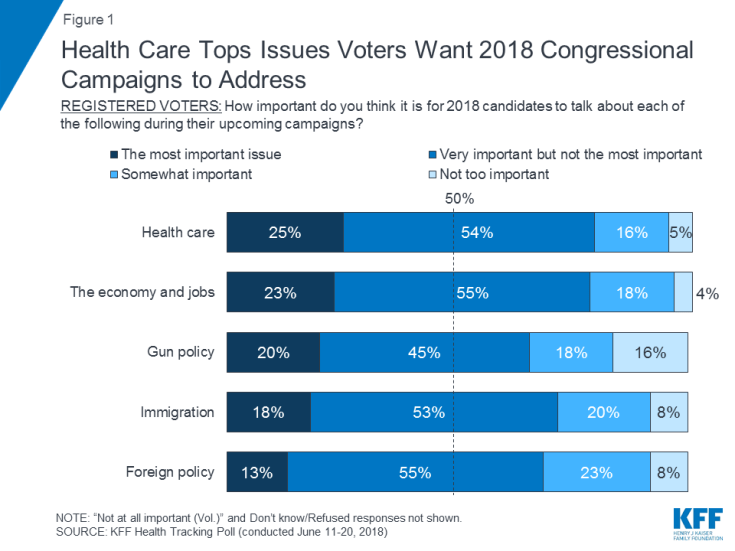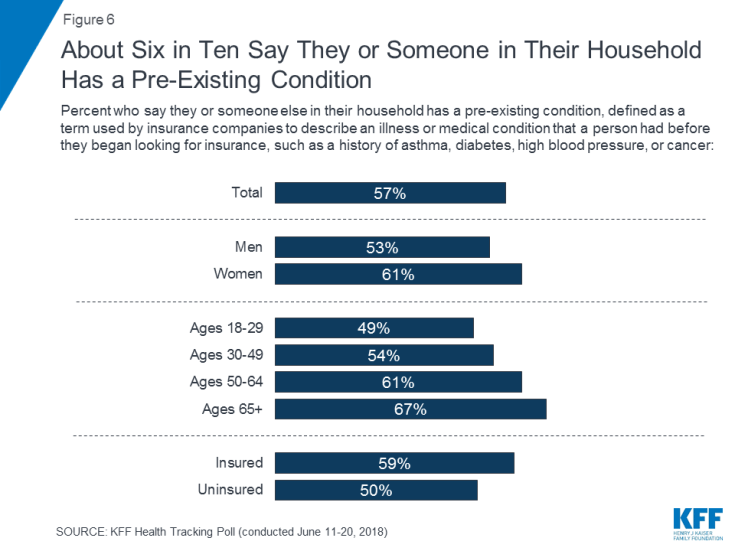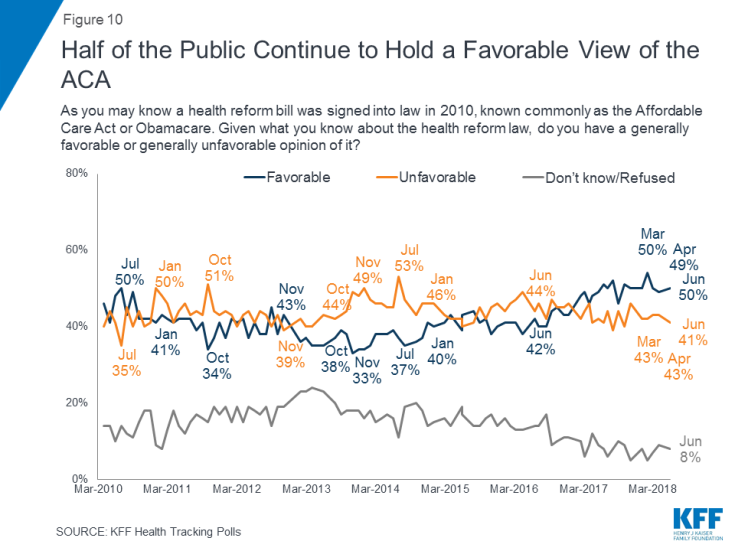Kaiser Health Tracking Poll – June 2018: Campaigns, Pre-Existing Conditions, and Prescription Drug Ads
Key Findings:
- Health care continues to be one of the top issues that voters want to hear candidates talk about during their 2018 congressional campaigns. One-fourth of voters say health care is the “most important issue” for 2018 candidates to discuss during their campaigns, which is similar to the share who say the same about the economy and jobs (23 percent). While health care is a top issue for Democratic and independent voters, it remains a second tier issue for Republican voters.
- Few voters (about one in ten) say a candidate’s support for a variety of different health care positions will be the “single most important factor” in their 2018 vote choice. But among the health care issues provided, majorities of Democratic voters, independent voters, and Republican voters say a candidate’s support for continued protections for people with pre-existing health conditions is either the “single most important factor” or “very important, but not the most important factor” to their vote.
- In light of a recent federal lawsuit and subsequent decision by the Trump administration, this month’s tracking poll finds most of the public – including majorities of Republicans, Democrats, and independents – say it is “very important” to them that the ACA’s provisions protecting those with pre-existing conditions remain law. Three-fourths say it is “very important” that the ACA provision prohibiting insurance companies from denying coverage due to someone’s medical history remains law, and seven in ten say the same about the ACA provision prohibiting insurance companies from charging sick people more. Nearly six in ten Americans say they live in a household where someone has a pre-existing medical condition.
- A majority of the public – including eight in ten Democrats – support President Trump’s plan to require drug manufacturers to publish list prices for their prescription drugs in television advertisements.
- While most have seen or heard advertisements for prescription drugs, about one in seven say they have talked to their doctor as a result of seeing an advertisement for a prescription drug. Yet, among the fourteen percent of the public who have talked to their doctor about a drug they saw advertised – more than half (55 percent, 11 percent of adults) say they were prescribed the drug they asked about and half (48 percent, 10 percent of adults) discussed the price of the drug with their doctor.
Top Issues for 2018 Congressional Campaigns
Health care continues to be one of the top issues that voters want to hear candidates talk about during their 2018 congressional campaigns. One-fourth of voters say health care is the “most important issue” for 2018 candidates to discuss during their campaigns, which is similar to the share who say the same about the economy and jobs (23 percent). Slightly fewer say gun policy (20 percent), immigration (18 percent)1, and foreign policy (13 percent) are the most important issues for 2018 candidates to talk about during their campaigns.
Health Care and Republican Voters
While health care is a top issue for Democratic and independent voters, it remains a second tier issue for Republican voters. One-fourth (27 percent) of Republican voters say the economy and jobs is the most important issue for candidates to talk about during their campaigns, followed by immigration (19 percent), and health care (18 percent). However, the share of Republican voters who say health care is the most important issue has risen slightly since January 2018 when one in ten (13 percent) Republican voters said it was the most important issue.
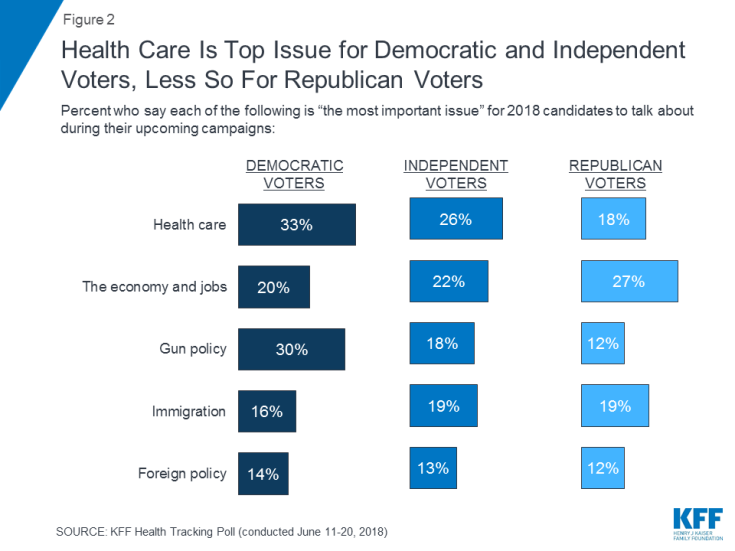
Figure 2: Health Care Is Top Issue for Democratic and Independent Voters, Less So For Republican Voters
Which Health Care Issues Matter Most to Voters?
Few voters (about one in ten) say a candidate’s support for a variety of different health care positions will be the “single most important factor” in their 2018 vote choice, but about two-thirds say a candidate’s support for continued protections for people with pre-existing health conditions is either the “single most important factor” or “very important, but not the most important factor.” Fewer – but still a majority – say a candidate’s support for passing legislation to bring down prescription drug costs (58 percent), support for repealing the Affordable Care Act (ACA) (53 percent), or passing legislation to stabilize the ACA marketplaces (52 percent) is either the single most important or a very important factor. Half (48 percent) say a candidate’s support for passing a national health plan, or Medicare-for-all is very or most important to their 2018 vote choice.
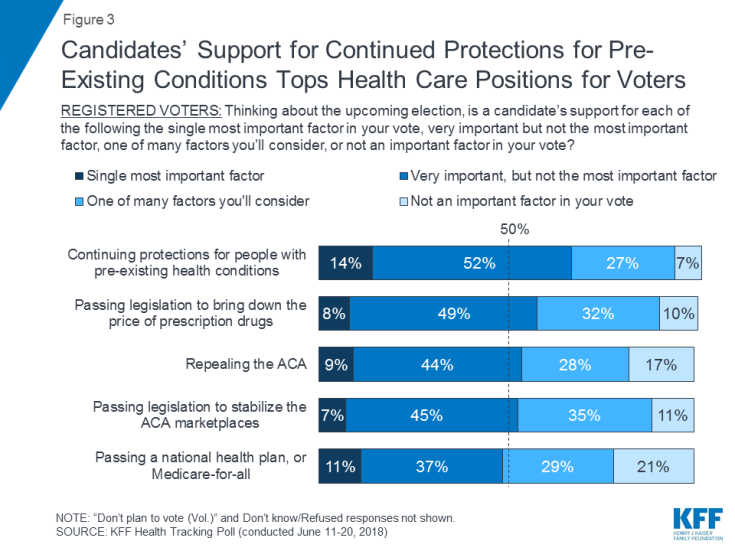
Figure 3: Candidates’ Support for Continued Protections for Pre-Existing Conditions Tops Health Care Positions for Voters
Partisans Differ on Top Health Care Positions for Candidates
Partisan voters have different views on how a candidate’s support for various health care positions will affect their vote choice. For Democratic voters, a candidate’s support for continued protections for people with pre-existing conditions is at the top of the list with eight in ten (81 percent) Democratic voters saying it is the most important or very important factor to their 2018 vote choice. This is followed by a candidate’s support for stabilizing the ACA marketplaces (69 percent), support for passing a national health plan, or Medicare-for-all (68 percent), and support for passing legislation to bring down the price of prescription drugs (66 percent). Fewer (57 percent) say a candidate’s support for repealing the ACA will be very or most important to their vote.
Among Republican voters, nearly six in ten say a candidate’s support for repealing the ACA is very or most important to their 2018 vote choice. Half say the same about a candidate’s support passing legislation to bring down the price of prescription drugs (52 percent) and support for continued protections for people with pre-existing conditions (51 percent). Across all other issues, less than half of Republican voters say it will be very or most important to their 2018 vote.
| Table 1: How Important Is A Candidate’s Support on Health Care Issues To Voters? | ||||
| Percent who say a candidate’s support for each of the following will be the… in their vote: | Democratic Voters |
Independent Voters |
Republican Voters |
|
| Continuing protections for people with pre-existing conditions | Single most important factor | 18% | 15% | 8% |
| Very important, but not most important factor | 63 | 48 | 43 | |
| Passing legislation to bring down the price of prescription drugs | Single most important factor | 9 | 8 | 9 |
| Very important, but not most important factor | 57 | 44 | 43 | |
| Repealing the 2010 Affordable Care Act | Single most important factor | 10 | 9 | 9 |
| Very important, but not most important factor | 47 | 37 | 49 | |
| Passing legislation to stabilize the ACA marketplaces | Single most important factor | 11 | 7 | 2 |
| Very important, but not most important factor | 57 | 45 | 35 | |
| Passing a national health plan, or Medicare-for-all | Single most important factor | 17 | 9 | 7 |
| Very important, but not most important factor | 51 | 36 | 24 | |
Public Supports ACA Protections for Those With Pre-Existing Conditions
President Trump’s administration announced earlier this month that it will no longer defend the ACA’s protections for people with pre-existing medical conditions. These provisions prohibit insurance companies from denying coverage based on a person’s medical history (known as guaranteed issue), and prohibit insurance companies from charging those with pre-existing conditions more for coverage (known as community rating). The Trump administration argues that both of these protections are unconstitutional and should be deemed invalid once the individual mandate penalty goes away starting January 1, 2019. The majority of the public – including majorities of Republicans, Democrats, and independents – say it is “very important” to them that the ACA’s provisions protecting those with pre-existing conditions remain law.
Three-fourths of the public (76 percent) say it is “very important” to them that the provision that prohibits health insurance companies from denying coverage because of a person’s medical history remains law. An additional fifteen percent say it is “somewhat important” this provision remains law. Similarly, seven in ten (72 percent) say it is “very important” that the provision that prohibits health insurance companies from charging sick people more remains law, while an additional one in five (17 percent) say it is “somewhat important.”
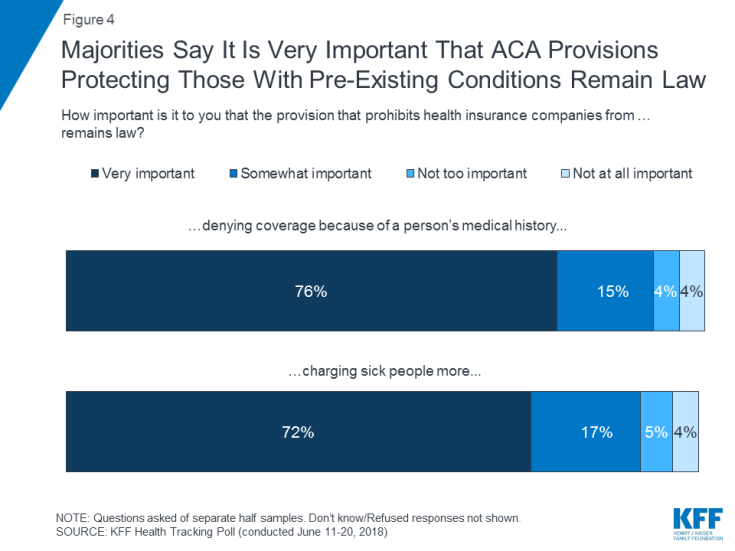
Figure 4: Majorities Say It Is Very Important That ACA Provisions Protecting Those With Pre-Existing Conditions Remain Law
Majorities Across PArty Lines Support Protections for Those With Pre-eXisting Conditions
Majorities, across party identification and household health status, say it is “very important” that these protections remain law. Nine in ten Democrats (88 percent), 77 percent of independents, and 58 percent of Republicans say it is “very important” that insurance companies cannot deny coverage because of a person’s medical history. Similarly, a majority (85 percent of Democrats, 70 percent of independents, and 58 percent of Republicans) – say it is “very important” that health insurance companies cannot charge sick people more. Even among those living in households without anyone with pre-existing conditions – therefore, unlikely to be affected negatively by this change in policy – a majority say it is “very important” these protections remain.
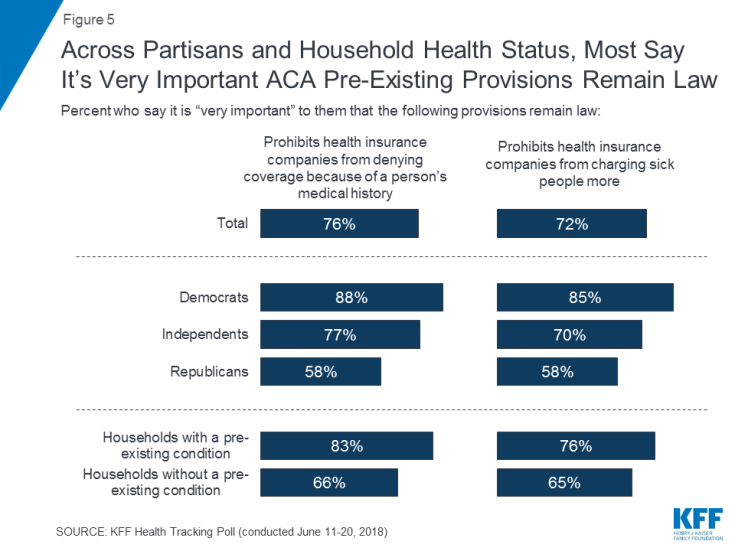
Figure 5: Across Partisans and Household Health Status, Most Say It’s Very Important ACA Pre-Existing Provisions Remain Law
This most recent poll finding is similar to previous KFF polling on this issue. Public support for protections for individuals with pre-existing conditions had broad support prior to the passage of the 2010 health care law. A February 2010 Kaiser Health Tracking Poll found three-fourths (76 percent) of the public saying it is either “extremely important” or “very important” that reforming health insurance so that insurance companies can’t deny coverage based on pre-existing conditions is passed into law. Immediately after the election of President Trump, KFF polling found there was still majority support for the requirement that health insurance companies have to cover everyone regardless of medical history, with majorities of Democrats (75 percent), independents (65 percent), and Republicans (63 percent) saying they had a favorable opinion of this ACA provision.
Nearly Six in Ten Say They or Someone in Their Household Has a Pre-Existing Health Condition
Nearly six in ten (57 percent) say they or someone in their household suffers from pre-existing medical conditions such asthma, diabetes, or high blood pressure. Women (61 percent) are more likely to report someone in their household with a pre-existing condition than men (53 percent), as are older individuals (67 percent of those age 65 or older) compared to half (49 percent) of adults 18 to 29 years old.
Broad Support for Requiring Prices in Prescription Drug Advertisements
On May 11, 2018, President Trump announced his plan titled, “American Patients First,” an effort aimed at lowering the price of prescription drugs. One key element of this plan is to require drug manufacturers to publish list prices for their prescription drugs in television advertisements. Three-fourths (76 percent) of the public favor the federal government requiring prescription drug advertisements to include a statement about how much the drug costs. In a rare instance of bipartisanship, this policy proposal is supported by a majority of Democrats (83 percent), independents (73 percent) and Republicans (72 percent).
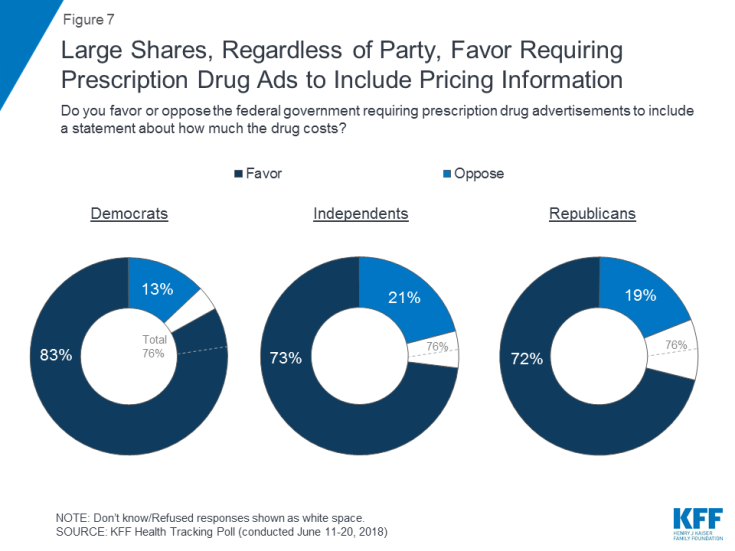
Figure 7: Large Shares, Regardless of Party, Favor Requiring Prescription Drug Ads to Include Pricing Information
Prevalence of Prescription Drug Advertisements
Seven in ten (72 percent) say they have ever seen or heard any advertisements for prescription drugs, which is similar to the share who say they saw or heard such an advertisement in the past 12 months (69 percent).

Figure 8: About Seven in Ten Report Seeing or Hearing Drug Ads; Similar Shares Say They’ve Seen/Heard Any in the Past Year
One in seven say they have talked to their doctor as a result of seeing an advertisement for a prescription drug while more than half (56 percent) say they have seen or heard advertisements for prescription drugs but have never spoken to their doctor about these ads.
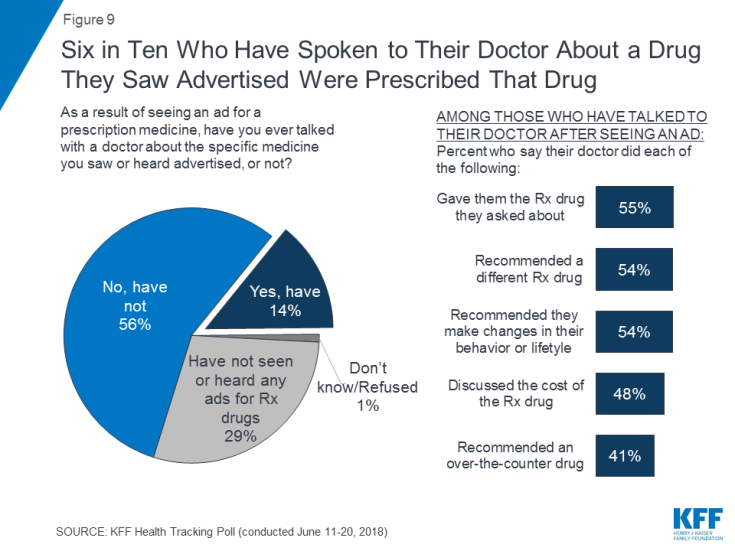
Figure 9: Six in Ten Who Have Spoken to Their Doctor About a Drug They Saw Advertised Were Prescribed That Drug
Among those who have spoken to their doctor about a specific medicine they saw advertised, nearly six in ten (55 percent) say the doctor gave them the drug they asked about, their doctor recommended a different prescription drug (54 percent), or their doctor recommended that they make changes in their behavior or lifestyle (54 percent). Half (48 percent) say their doctor discussed the cost of the drug while four in ten (41 percent) say their doctor recommended an over-the-counter drug instead.
Public’s Views of the Affordable Care Act
Half of the public continue to hold favorable views of the 2010 health care law, known as the Affordable Care Act. This continues the more than a year-long trend of a larger share of the public viewing the law favorably (50 percent) than unfavorably (41 percent).

